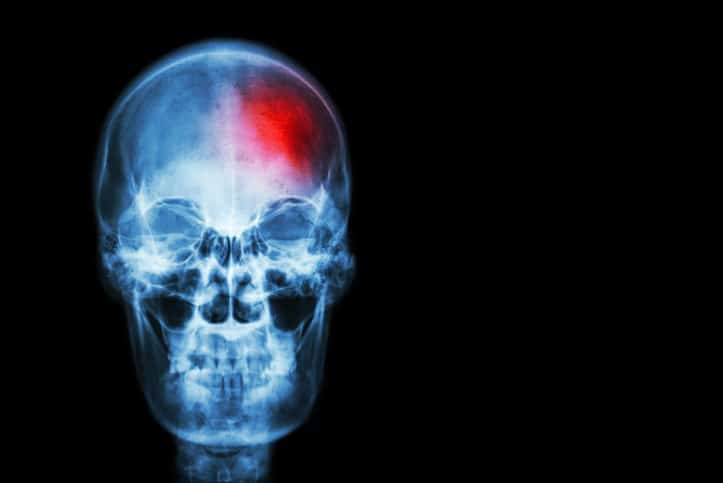If you suffer a stroke, fast treatment can mean the difference between life and death.
But the signs of stroke can be subtle. It can be difficult to know if you should call 911 or if you have a minor problem that will go away on its own.
It’s crucial that you know the difference.
Almost 800,000 Americans a year suffer a stroke. About 140,000 of them die as a result. Getting fast treatment is often a lifesaver. Or it can save you from lifelong disability and help you make a full recovery.1
A stroke occurs when a blood vessel in the brain ruptures or is blocked by a clot. When a vessel in the brain ruptures, it is called a hemorrhagic stroke. It is often referred to as a “massive stroke.” Its survival rate is less than 36%.
There is no mistaking the symptoms of this kind of stroke. The victim often suffers a sudden and severe headache. This is typically followed by seizures, vomiting, paralysis on one side, and/or loss of consciousness.
An ischemic stroke is different. It’s caused by a blood clot. And it accounts for 85% of all strokes.
Recommended for You: What REALLY Causes Heart Attacks?
It’s not high cholesterol. It’s not eating saturated animal fats. It’s not even lack of exercise or elevated blood pressure.
Instead, 5 everyday things put you at risk for sudden death by heart attack or stroke. And you probably did 3 of them before lunch today. In this special presentation, we tell you what all 5 are. And more important, how to protect yourself.
The symptoms of an ischemic stroke are less severe. That’s why patients often make the grave mistake of delaying medical care. With fast treatment, the 10-year survival rate is almost 70%.2
The standard treatment is a clot-dissolving compound called tissue plasminogen activator (tPA). If it is administered within three hours of a stroke, the chances of disability drop dramatically.3
Most people know that sudden numbness on one side of the body means they may have suffered a stroke. But there are other symptoms that are less obvious.
Knowing the ‘FAST’ Signs of Stroke Can Save Your Life
There’s a simple acronym to help you determine if you or someone you know is having a stroke. It’s called F-A-S-T:
Face Drooping: A stroke sometimes does not cause full-blown paralysis or numbness on one side. Check the patient’s face. Does one side droop? Is it numb? Ask the person to smile. Check to see if their smile is lopsided or uneven.
Arm Weakness: Ask the person to raise both arms. Can they lift them evenly or does one arm drift downwards?
Speech Difficulty: Is the person slurring words and hard to understand? Can they follow simple instructions? Ask the person to repeat this sentence: “The sky is blue.” Are the words garbled?
Time to Call 911: If someone fails even one of these three tests, call 911 immediately.
Neurologists have a saying about stroke treatment: “Time lost is brain lost.” The faster a patient gets treatment, the less brain damage they will suffer.4
There are other stroke symptoms that can occur either with the signs of FAST or independently:
- Sudden trouble seeing. It can be in one eye or both. This can include blurry or double vision.5
- Loss of balance. Abrupt trouble walking or coordinating body movements. This comes on quickly, unlike the balance problems of old age.
When you call 911, be sure to mention that you or someone with you is possibly suffering a stroke. This will allow the 911 operator to route the ambulance to the nearest certified stroke center. These are hospitals with personnel that are specially trained for stroke treatment.6
3 Natural Ways to Prevent a Stroke
Most people know that you can lower your chances of stroke by controlling your blood pressure, not smoking, maintaining a healthy weight, and exercising. But there are three other ways to reduce your risk:
- Eat at least eight ounces of fruits and vegetables a day. Researchers found this lowers stroke risk by up to 32%.
- Eat plenty of protein. A UK study showed that people who take protein supplements improve stroke risk factors. They have lower blood pressure, LDL cholesterol, triglycerides, and better blood vessel flexibility.
- Get six to eight hours of sleep a night. A National Institutes of Health study found that people who get less than six hours of sleep, as well as those who sleep more than eight hours, increase their stroke risk by 74% or more.
One more thing… If you’ve had a stroke, there’s one supplement you should never take: calcium.
An alarming study published in the journal Neurology shows that female stroke survivors who took calcium to prevent osteoporosis had a nearly 700% increased risk of developing dementia.
Like this Article? Forward this article here or Share on Facebook.
References:
1http://www.strokeassociation.org/STROKEORG/General/Why-Getting-Quick-Stroke-Treatment-Is-Important_UCM_451540_Article.jsp
2http://www.uptodate.com/contents/ischemic-stroke-prognosis-in-adults
3http://www.strokeassociation.org/STROKEORG/WarningSigns/Stroke-Warning-Signs-and-Symptoms_UCM_308528_SubHomePage.jsp
4http://www.strokeassociation.org/STROKEORG/General/Joe-Downing-EMS-Professionals-Expertise-Helped-Save-Police-Officers-Life_UCM_451867_Article.jsp
5http://www.rnib.org.uk/eye-health-eye-conditions-z-eye-conditions/stroke-related-eye-conditions
6https://www.heart.org/HEARTORG/Professional/HospitalAccreditationCertification/PrimaryStrokeCenterCertification/Primary-Stroke-Center-Certification_UCM_439155_SubHomePage.jsp

